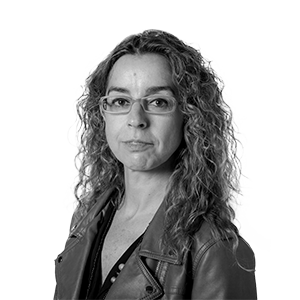The new life in Olot of the Afghan translator and his family
They fled from Kabul airport and, after a hellish journey, they are in Catalonia

OlotThey say that the eight-hour coach journey from Madrid to Olot was a joy compared to the hellish journey they had to make from Herat, the Afghan city where they are from, to Kabul to catch a Spanish evacuation flight. "Here the roads are real roads, there are public toilets and the bus stopped every two hours", she says with a look of astonishment on her face. In Afghanistan the trip lasted 24 hours, the road was mostly dirt and the bus stopped on only one occasion.
Javad Hossaini, Fatemah Mohammadi and their son Amir Mohammad, 5, are one of the many Afghan families who have arrived in Spain in recent days. He, a physiotherapist by profession, had been a translator for several Spanish journalists for years. She worked as a doctor. Now they don't know what the future holds for them. They have just arrived in Olot and are a bit lost. "We wanted to go to Barcelona but there were no flats available so they brought us here", says Javad, who admits that he knows little about the city, apart from the fact that it has around 30,000 inhabitants, is in the province of Girona and Catalan is spoken there.
For the next six months they will live in a rented flat managed by Cepaim foundation, which has four rooms and capacity for six people. At the moment they are alone, but at any moment another family may arrive. "God willing, no one else will come", says Fatemah, unable to hide her annoyance at having to live with strangers. "And if they do come, at least they should be clean".
Javad explains that when they arrived in Olot on 26 August, the flat had everything: sheets, towels, personal hygiene products and some food. The kitchen was also fully equipped. In addition, she adds, a Cepaim worker accompanied them to a Mercadona supermarket and told them they could spend 28 euros on food. "It's the first time in my life that I look for the cheapest things", he says. In Afghanistan they lived well: they had a house, a car and no economic hardship.
"They have told us that they will give us 272 euros a month for food and 120 for other expenses", Javad explains. The head of Cepaim in Olot, Núria Vila, adds that they will also be paid 90 euros per head every six months for the purchase of clothes, and they will be provided with cleaning materials or other products they need. "After six months, they will be given financial support so that they can rent a flat on their own", she says. They can receive support for up to 18 months, she says, which is the maximum time it is estimated to take for them to qualify for asylum protection.
Still Javad and Fatemah can't help but worry about money. They are a bit obsessed with prices. "I bought a card for my mobile phone and it cost me 10 euros!" he says, unable to believe it's so expensive. Besides, he complains, in just four days he's almost out of internet on his phone. She explains that she has bought flour to make bread in order to save money and because, she confesses, the Mercadona bread seemed to her to be very bad. They aren't aware that that there are bakeries.
The couple arrived in Olot with very little. They had more luggage but had to leave it along the way. Entering Kabul airport was an odyssey: there were so many people that they couldn't carry that much weight. They brought three summer and two winter outfits for their son, and two summer outfits for each of them, says Fatemah. "And how come we didn't even pack a toy for the child?" he asks. "I didn't have time, I barely had two hours to prepare everything", she answers. Javad admits that they left in a hurry: "There were no flights from Herat to Kabul and it was very difficult to find a seat on the buses. So, as soon as I found one, I told my wife that we had to leave immediately".
What Javad and Fatemah value most in Olot is the feeling of freedom and security, which they say they have never had before. "Here I can go anywhere, day or night, with my family, without fear of anything happening to them", he says. What they like most, the Fluvià river. "We love to hear the sound of the water running". "I like the park", says the son with a smile on his face, and stretching out his arm to attract attention.
Now, they say, they hope to be useful here in Catalonia. To be able to work and contribute something to society. What worries them? The family they have left behind, in Afghanistan, they answer. "When we managed to get into Kabul airport I called my father and he burst into tears. I had never heard him cry before. Since then he hasn't wanted to pick up the phone", Javad explains. Fatemah says her family also cries every time she calls them. She worries about one more thing: "In Afghanistan I studied medicine at university for seven years. Will they recognise my degree here? Will I be able to work as a doctor?"
